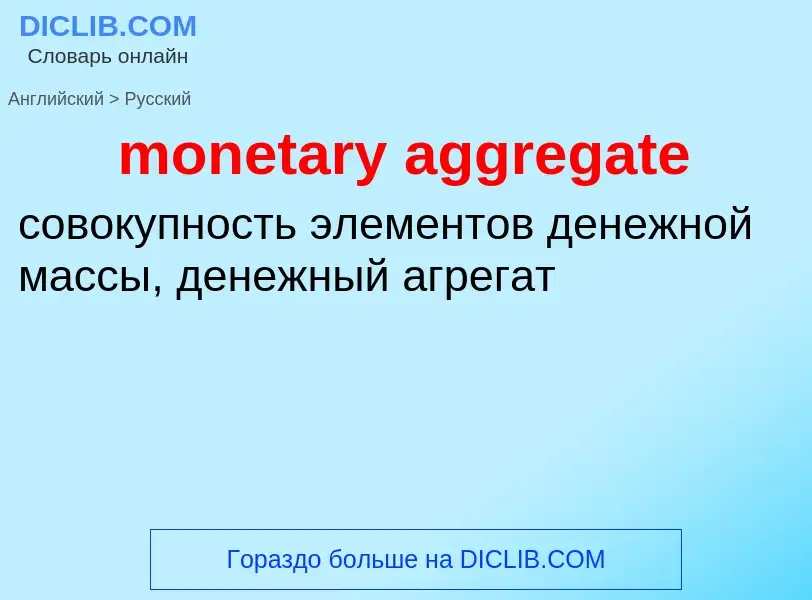Перевод и анализ слов искусственным интеллектом ChatGPT
На этой странице Вы можете получить подробный анализ слова или словосочетания, произведенный с помощью лучшей на сегодняшний день технологии искусственного интеллекта:
- как употребляется слово
- частота употребления
- используется оно чаще в устной или письменной речи
- варианты перевода слова
- примеры употребления (несколько фраз с переводом)
- этимология
monetary aggregate - перевод на русский
денежная масса, сумма денег в обращении (включая банковские депозиты); запас денег
общая лексика
крупный заполнитель
строительное дело
крупный заполнитель (с размером зёрен от 4,76 мм)
существительное
общая лексика
Международный валютный фонд (ООН), МВФ
синоним
общая лексика
Международный валютный фонд
Определение
Википедия
In macroeconomics, the money supply (or money stock) refers to the total volume of currency held by the public at a particular point in time. There are several ways to define "money", but standard measures usually include currency in circulation (i.e. physical cash) and demand deposits (depositors' easily accessed assets on the books of financial institutions). The central bank of a country may use a definition of what constitutes legal tender for its purposes.
Money supply data is recorded and published, usually by a government agency or the central bank of the country. Public and private sector analysts monitor changes in the money supply because of the belief that such changes affect the price levels of securities, inflation, the exchange rates, and the business cycle.
The relationship between money and prices has historically been associated with the quantity theory of money. There is some empirical evidence of a direct relationship between the growth of the money supply and long-term price inflation, at least for rapid increases in the amount of money in the economy. For example, a country such as Zimbabwe which saw extremely rapid increases in its money supply also saw extremely rapid increases in prices (hyperinflation). This is one reason for the reliance on monetary policy as a means of controlling inflation.



![Components of the money supply of [[India]] in billions of [[Rupee]] for 1950–2011 Components of the money supply of [[India]] in billions of [[Rupee]] for 1950–2011](https://commons.wikimedia.org/wiki/Special:FilePath/India Money Supply Components--Larger Label Fonts.png?width=200)
![CPI]] CPI]]](https://commons.wikimedia.org/wiki/Special:FilePath/Inflation M2 CPI.webp?width=200)


![The [[euro]] money supplies M0, M1, M2 and M3, and euro zone GDP from 1980–2021. Logarithmic scale. The [[euro]] money supplies M0, M1, M2 and M3, and euro zone GDP from 1980–2021. Logarithmic scale.](https://commons.wikimedia.org/wiki/Special:FilePath/Money supply Euro.png?width=200)
![[[Japan]]ese money supply (April 1998 – April 2008) [[Japan]]ese money supply (April 1998 – April 2008)](https://commons.wikimedia.org/wiki/Special:FilePath/Money supply of japan.gif?width=200)
![[[New Zealand]] money supply 1988–2008 [[New Zealand]] money supply 1988–2008](https://commons.wikimedia.org/wiki/Special:FilePath/New zealand money supply 1988-2008.jpg?width=200)


.jpg?width=200)


![On 28 June 2011, [[Christine Lagarde]] was named managing director of the IMF, replacing Dominique Strauss-Kahn. On 28 June 2011, [[Christine Lagarde]] was named managing director of the IMF, replacing Dominique Strauss-Kahn.](https://commons.wikimedia.org/wiki/Special:FilePath/Christine Lagarde - Université d'été du MEDEF 2009.jpg?width=200)

![IMF "Headquarters 1" in Washington, D.C., designed by [[Moshe Safdie]] IMF "Headquarters 1" in Washington, D.C., designed by [[Moshe Safdie]]](https://commons.wikimedia.org/wiki/Special:FilePath/IMF HQ.jpg?width=200)
![[[Anarchist]] protest against the IMF and corporate bailout [[Anarchist]] protest against the IMF and corporate bailout](https://commons.wikimedia.org/wiki/Special:FilePath/IMF demonstration (10).png?width=200)
![IMF member states not accepting the obligations of Article VIII, Sections 2, 3, and 4<ref>[http://www.imf.org/external/pubs/ft/aa/aa08.htm Articles of Agreement of the International Monetary Fund, Article VIII – General Obligations of Members]<br />Section 2: Avoidance of restrictions on current payments;<br /> Section 3: Avoidance of discriminatory currency practices;<br />Section 4: Convertibility of foreign-held balances.</ref>}} IMF member states not accepting the obligations of Article VIII, Sections 2, 3, and 4<ref>[http://www.imf.org/external/pubs/ft/aa/aa08.htm Articles of Agreement of the International Monetary Fund, Article VIII – General Obligations of Members]<br />Section 2: Avoidance of restrictions on current payments;<br /> Section 3: Avoidance of discriminatory currency practices;<br />Section 4: Convertibility of foreign-held balances.</ref>}}](https://commons.wikimedia.org/wiki/Special:FilePath/International Monetary Fund (art.VIII).png?width=200)
![The Gold Room within the [[Mount Washington Hotel]] where the [[Bretton Woods Conference]] attendees signed the agreements creating the IMF and [[World Bank]] The Gold Room within the [[Mount Washington Hotel]] where the [[Bretton Woods Conference]] attendees signed the agreements creating the IMF and [[World Bank]]](https://commons.wikimedia.org/wiki/Special:FilePath/The Gold Room Bretton Woods Reverse Angle.jpg?width=200)
